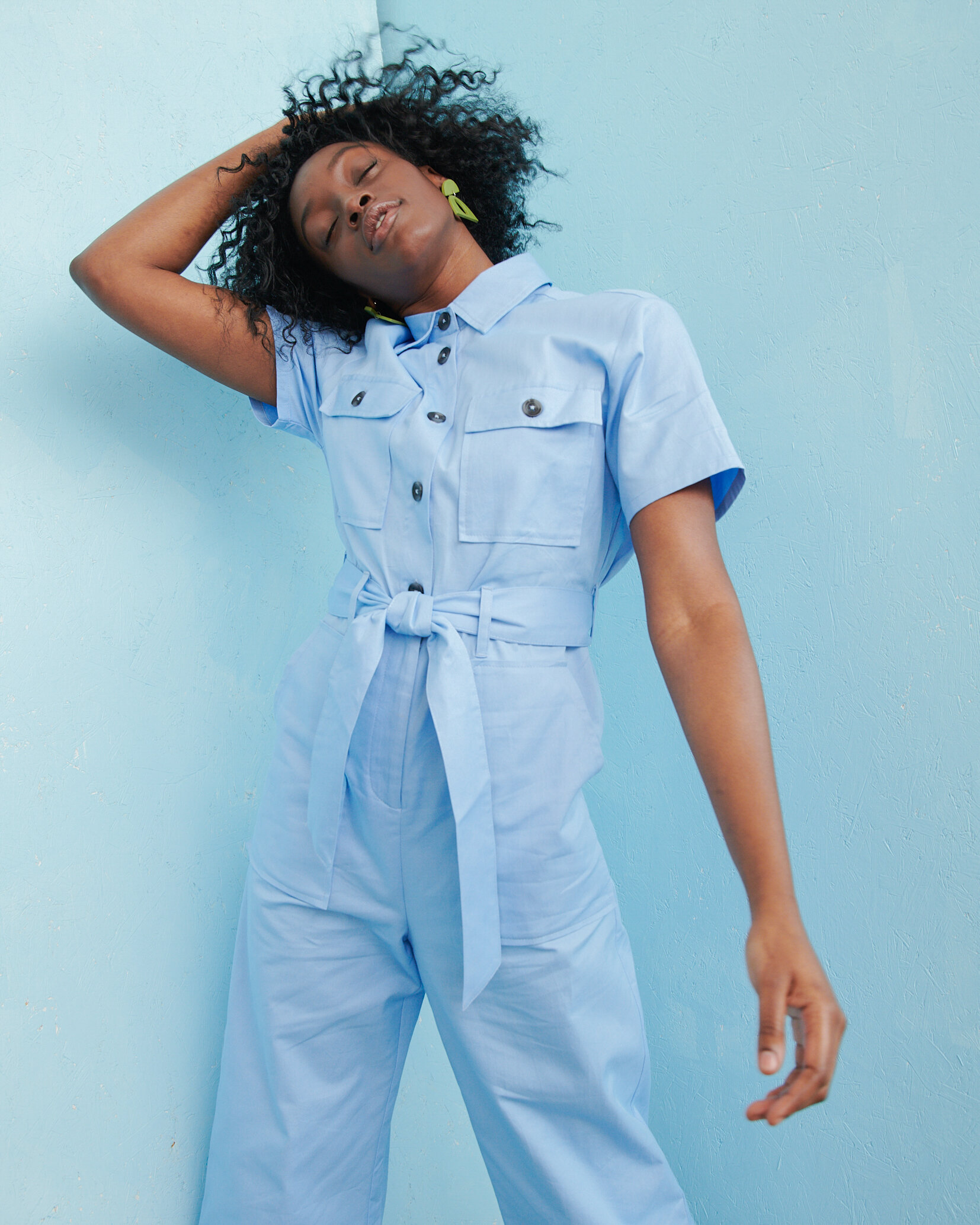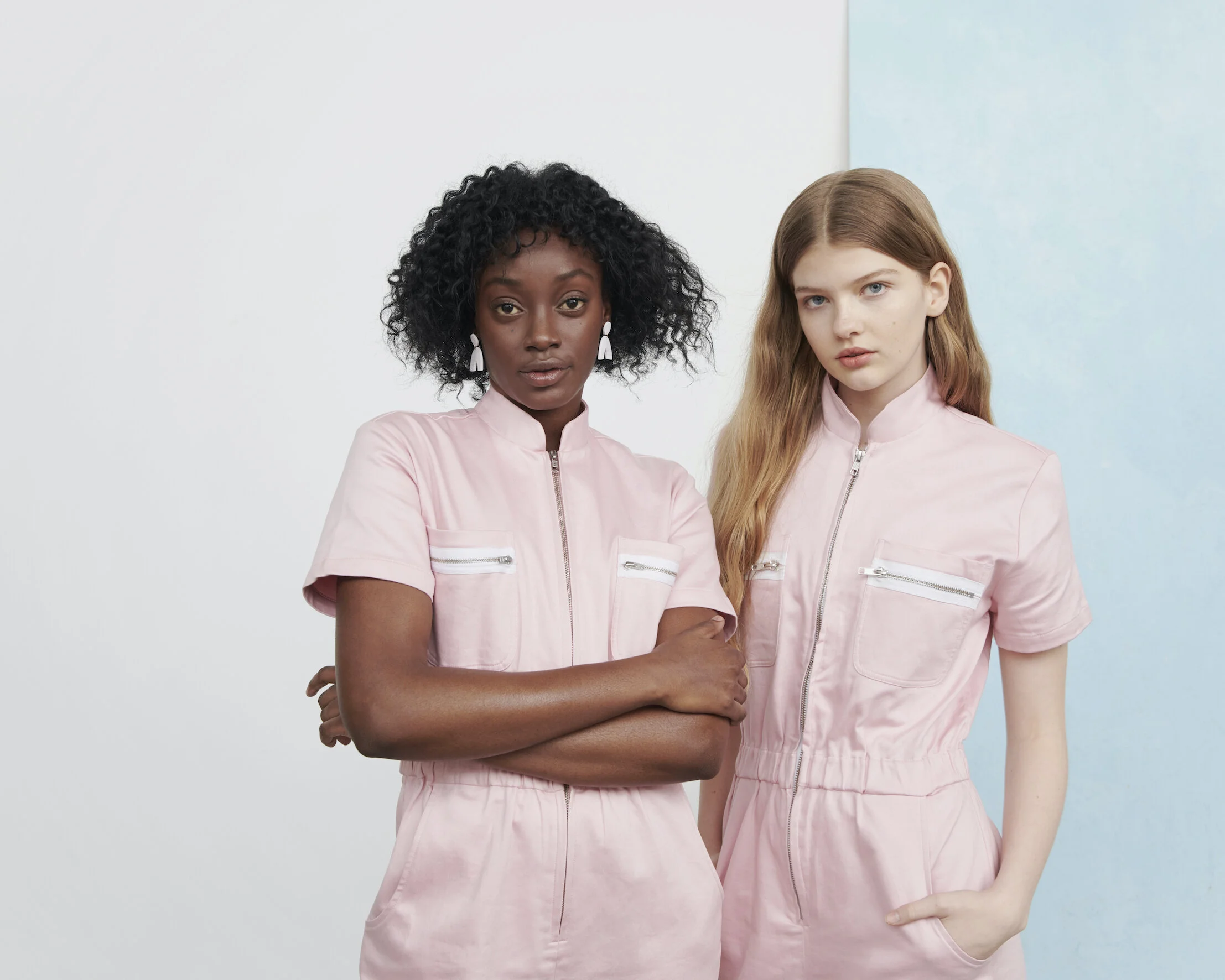
From Fast Fashion to Fair Fashion:
Building a brand to combat a wasteful industry
Founder and Creative Director, Jess McCleave, discusses how the obstacles she faced in the fast fashion industry led her to start her own ethical and sustainable label ILK+ ERNIE .
Founder and Creative Director, Jess McCleave
Jess, tell us a little about your background in fashion:
I studied at London College of Fashion, followed by working in retail. This led to a position at a leading high street designer doing visual merchandising.
I didn’t have the easiest time. I had a difficult manager who made me feel like I was not worthy of the career I dreamed of having. It wasn’t until a new manager joined that I was promoted to head office. Sadly it didn’t matter where I worked, my fashion career was always met with lots of obstacles. I tried a variety of jobs in the fashion industry, always trying to find my niche. But I was always expected to work crazy hours for virtually nothing, with no recognition.
My last job in Fashion was in PR. On my way home from work one night I was mugged. I emailed my manager telling her what happened to me and that I couldn't go into work tomorrow. Her response was “if you are not at your desk by 10am tomorrow morning, don't come back”.
I was so upset, and ground down by the industry. With the support of my Dad I quit. I decided I needed to take a break from Fashion. I’d previously been told I was “too nice to work in Fashion, you don’t belong here”. When people tell you that enough times you start to believe it.
“I did the classic ‘booking a one way ticket to India to find myself’. I was there for 4 months”.
After that I did some random jobs, even as PA for Simon Cowell for a short while. But I was craving getting back into Fashion. I’d been designing clothes since I was six and it was really sad that I felt I couldn’t be part of an industry because of who I was and my standards.
I started designing again, showed some friends my designs and felt encouraged by their support, telling me I should have them made. I felt like I needed a dramatic shift in my life, I did the classic ‘booking a one way ticket to India to find myself’. I was there for 4 months.
What was it about the Fast Fashion Industry that turned you off?
When I was a visual merchandiser I couldn’t get my head around how many garments were coming into the flagship store every week. Everything was so fast and none of the styles were repeated. It felt incredibly wasteful. I also struggled with the mentality of fast fashion - wanting a new outfit every weekend. There was no level of satisfaction, everyone was chasing their next fashion fix. The quality was also terrible compared to vintage pieces you find nowadays, everything was better quality and made to last years ago.
How does the Fashion Industry need to change for the better?
I really think people’s attitudes and mindsets towards the way they buy fashion needs to change. It's unrealistic to expect someone who buys their clothes in Primark to come to my brand instead and spend £130 on a jumpsuit. But there are ways of purchasing thoughtfully. Ask yourself, are you going to wear it more than once? Can it be part of a staple wardrobe rather than just something you’re going to wear once over the weekend. If that changes, I believe everything can shift in the right direction.
“When I started my ethical and sustainable business 4 years ago, no one cared about those aspects of the brand. “
What makes ILK + ERNIE so unique?
One of the unique aspects of the brand is the entire collection is made from dead-stock fabrics. It’s basically fabric that’s left over from other fashion brands supply chains. An example of this is my supplier has connections with GAP who produce a lot of fabric in India. They’ll have the same cotton twill made every year in multiple colors. They only use a fraction of those colors in the end and the rest gets thrown away. It’s incredibly wasteful. Sometimes it finds its way to fashion markets, but if it’s still not sold it gets sent to landfill or incinerated. It’s mind blowing how much fabric gets wasted.
The reason why larger brands don’t want to do that is because the amount of fabric may only be enough for several garments, which doesn’t work for mass scale. But for brands like me it’s perfect!
In the last couple of years there has been an increased focus on ethically made and sustainable clothing, how did you find your factories and how is your product ethically made?
When I started my ethical and sustainable business 4 years ago, no one cared about those aspects of the brand. To me it was the best part about my business. Even when I was featured in magazines they failed to mention it was ethical and sustainable, it blew my mind. The ignorance of the industry was so intense. Now, we’ve seen such a change in the last 2 years towards people's attitudes with ethical fashion. It’s great that people are finally waking up to it, and want to support small businesses.
On my 4 month trip to India, I was lucky that so many people were willing to give me advice. I would ask them where their factories were based and absorb as much information as possible. I ended up in Delhi and met up with my cousin’s friend who owned a fashion label. His colleagues took me to a fabric market, which was near all the garment factories. I asked around and found a supplier who introduced me to Sam, who I now work with.
It’s been 4 years since I met Sam, he’s very well educated and really looks after his staff. It was important to me that ILK+ERNIE was ethically made. The garment workers had to be treated well, working in a safe and good quality environment, and paid a fair wage with benefits.
Talk us through some of the obstacles you’ve faced since you started your business:
I’ve been particularly unlucky with some of the obstacles I’ve faced, during two of the four years I wasn’t able to trade. About 6 months into launching my brand, I received a cease and desist from John Lewis. I was in the middle of having my second collection made, I had to cease all production and completely step away, working out how to rebrand my entire business. The brand originally had a different name, Kin London. It was apparently the same name as a new concession in John Lewis.
In 2018 I launched as ILK+ERNIE. Then in 2019 I had to take another year out of the business when a partnership I’d entered with another ethical fashion brand didn’t work out. They completely used me and basically bankrupted my business, I was left in a lot of debt as a result. I ended up doing a crowd fundraiser through Back Her Business to get my business back on track.
I managed to reach my target, enabling me to travel to India to hit the ground running again. The crowd funder really elevated my business, I’ve had so much support from people, it’s been incredible.
“I have always worked other jobs until this year when I was finally able to work solely on my business. ”
When launching a brand, funding is often the biggest challenge, how difficult has it been for you navigating this aspect of the business?
When I first started my business I signed up for The Prince’s Trust, a program for under 30’s with the potential of receiving a grant at the end. It involved an intense course and a business plan. Thankfully I was awarded the full grant at the end and my dad said if I got it he’d match it! That’s how I started my business.
Four years later I’ve only just started taking a wage from my company, everything has always gone back into the business. I have always worked other jobs until this year when I was finally able to work solely on my business.
Many of our readers often ask how to go about starting their own sustainable and ethical fashion brand, what are your top 5 tips for getting started:
1. Figure out where and who you want to make your product, there’s lots of platforms like Sewport for example, where you can connect with different factories worldwide.
2. Decide how you want to work, do your research, and figure out what fabrics you are using.
3. What makes your business sustainable and ethical? It’s such a broad area but thinking about what’s important to you and questioning your carbon footprint.
4. Start building your business, build a website, social media accounts etc.
5. Don’t give into temptation by caving in or cutting corners with the way you are producing your clothes. If you really want to start an ethical and sustainable business you have to stay true to that. It’s difficult but it's very rewarding.
6. Build a good community of small business owners, including other sustainable and ethical brands. It’s a great way to learn and collaborate with others.
Related Articles.
Fashion For Good: Shining a Light on Artists with Autism.
Designer, Co founder and COO- Jovana Mullins, discusses the challenges and rewards that came with starting a sustainable, social impact brand dedicated to working with designers with Autism.
06.16.20
Fast Is Not Free
In the next installment of this multi-part series, Alana examines the consequences of the Fast Fashion Industry on people and the planet.
08.12.20.
Mindfully Made: Starting a Home-Grown Ethical Fashion Brand
Designer and Creative Director Faye Anna Rochford, takes us through the creative process of starting her mindfully made label FéRí and tells us why resourceful design is so important to her.
07.15.20








